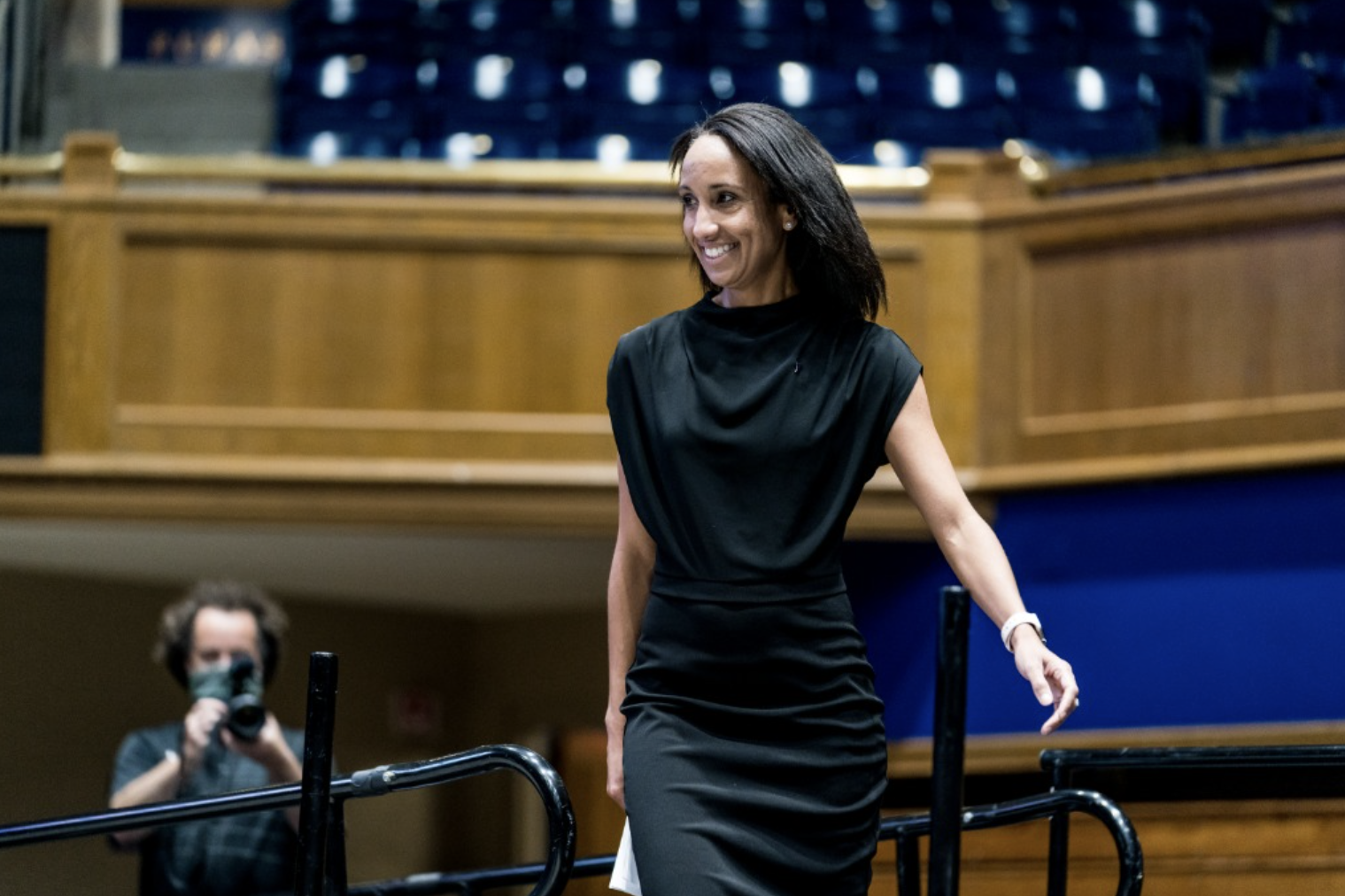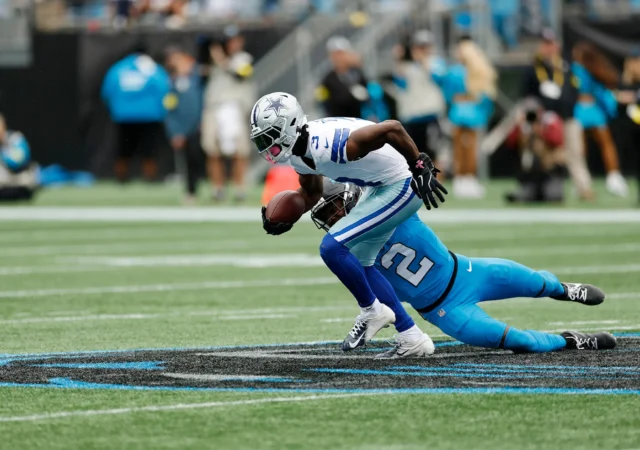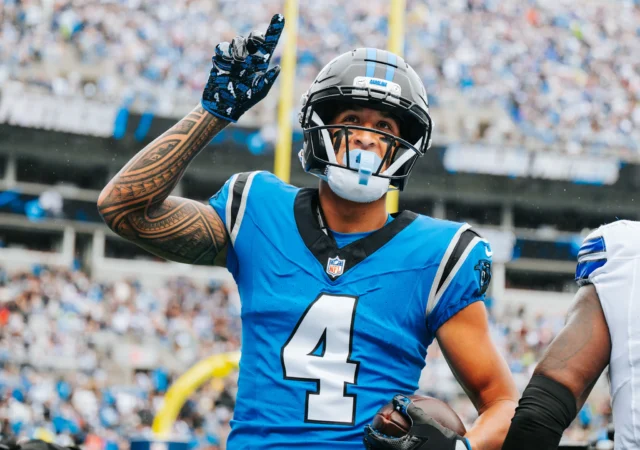In an historic ceremony at Cameron Indoor Stadium on Friday, Duke University President Vincent Price introduced Nina King as Duke’s next Vice President and Director of Athletics.
King will succeed Kevin White, who is retiring after 13 years in the post, on September 1. Among Power 5 institutions, King joins Vanderbilt’s Candice Storey Lee and Virginia’s Carla Williams as Black female directors of athletics.
Price kicked off Friday’s event with opening remarks before introducing King, who is the first woman to hold the position at Duke, to those in attendance that included members of Duke’s athletics staff, invited guests and media.
“I have often said that Duke’s excellence begins with the extraordinary people that come here to work, to study, conduct research and serve our neighbors,” said Price. “Nina is just such an extraordinary person. She will continue to foster a community in Duke Athletics that welcomes and supports all its members. I should also note that while Nina did not attend Duke as a student, her husband Rick and her kids have fully indoctrinated her into life as a Blue Devil.”

“I’m often asked, why Duke?,” said King during her speech. “For me the answer is simple. Duke is a magical place. The commitment to excellence is unmistakable and most importantly the drive and ambition amongst all the Duke students is inspirational. The people of this community are passionate and dedicated. I am proud that Duke Athletics plays a significant part in making Duke University so special. Duke is a top 10 institution in the country, a top 25 institution in the world, a pinnacle player in higher education – why not?”
Before closing, King made it a point to recognize the historic significance her appointment.
“I am a female black athletic director. There are only a few of us around the country. We’ve got work to do in our profession to continue to build the pipeline and ensure the deserving people have the opportunities to grow and to lead. One of the biggest reasons I am here today is to be a role model for little girls who look like me and to tell them ‘dream big because your dreams can be achieved.’ But I’m a boy mom and my message is the same to little boys. To children of all races – aspire to achieve greatness, dream big, be passionate because with dedication and hard work anything is possible.”
Per Release
Full Press Conference Transcript
On the changes involving Name, Image, Likeness:
“I think we should be a leader at the forefront of change. That is what Duke is all about and as I mentioned, we are going to continue to innovate and be modern. Name, image and likeness is a good thing. Change is ok. As an NCAA, as an organization, we need to remain nimble and flexible. We need to be ready to provide our student-athletes greater opportunities and allow them to profit off their name, image and likeness with the appropriate guardrails and I think that’s what we are all still trying to figure out and we better figure it out quickly here as the magic July 1 date approaches. Here at Duke, we are going to be ready. We’ve got a team of folks that have been working on this. We’ve engaged and collaborated with partners on campus, so that we are ready to provide awareness and education to our student-athletes. It’s going to be complicated, but as I mentioned, we are going to be ready.”
On having a feeling of responsibility for significance of hire:
“One hundred percent. I do feel a great responsibility and I embrace that. I am excited and as I mentioned, I want to show little girls who look like me that this is possible. Listen, we need to get better. Six female AD’s in the Power 5? I mean, three black females? We need to do better. I am happy to kind of be the next step toward progress and I am committed to helping ensure that more females, more people of color have opportunities like I do.”
On how realistic her goal of being an AD was:
“I’m here! It’s realistic. Like I said, young children and people who want to do this – dream big. I talk to our student-athletes all the time who have an interest in sport administration and doing what we do. It’s an enriching career, very rewarding. There are so many different paths to getting to where I am today and frankly where I’ve been. There’s no cookie-cutter way to get to be an AD, so if that’s your passion and that’s what you want to do, go for it.”
On the meaning of sports beyond competition:
“Sports is so great. It unifies us a society. We obviously have friendly rivalries and maybe some not so friendly ones, but it unifies us. It’s so amazing to watch our community come together, it’s a point of national pride. We are obviously in an Olympic year and it’s just so thrilling to be able to cheer on Team USA and all of our former student-athletes that are participating in the Olympic movement. Sports, it means so much. It provides a platform for our student-athletes, for our coaches, for athletes around the country to have their voices amplified and those that stand for meaningful causes and promote meaningful change, it really is a great platform. I think that we need to do a good job of telling our student-athletes’ stories and making sure that they have an opportunity to have their voices heard. I think we have, like I said, a great opportunity here. I am so proud of our student-athletes how they not only coped with COVID and pandemic, but how so many of them stepped up and spoke out against social injustices and demanding change and standing for racial equity. I mean, our student-athletes are really impressive in that way and so for all of us as coaches and administrators, as educators, we support them.”
On conversations she has had with other black, female AD’s:
“I have talked to Carla Williams of Virginia a lot throughout this process, and I did talk to her right before the announcement, as well as Candice Lee of Vanderbilt. Candice and I have been pretty close for several years now and both of them gave great advice. Stay true to who you are and be yourself. That is something I mean in any business and for all of us in life I think that is really important and something that I appreciate hearing from the two of them.”
On changes she would like to make on day one:
“Well, I’m not the Athletic Director yet and our AD, my boss is still sitting back there so (laughter). Listen, Duke Athletics is not broken. We are a very successful, high performing, elite, academic and athletic institution, so I don’t need to come in on day one and change everything. I am going to have to fill my position. Figuring out some staff and some organization shifts, how we are going to do this and ensure that we are set up for the very best success possible will certainly be a priority. But, I don’t think that there is going to be any sweeping changes that need to be made on day one. I do look forward to sitting down with all of our head coaches, our senior staff and understanding their program vision. Really, deeply understand. I am listening in a different way now because I am in this new role and so just really understand wants, needs, program vision I think will be really important in the beginning.”
On chatting with ACC Commissioner Jim Phillips and the future of the ACC and Duke’s role in it:
“Yes, I did. I had an opportunity to chat with Commissioner (Jim) Phillips yesterday and a great, quick conversation. Then yesterday, the ACC AD’s had their weekly meeting and Dr. (Kevin) White had a conflict, so I filled in for that meeting yesterday and had a chance to talk with my ACC colleagues as well.
“Commissioner Phillips’ vision for the ACC is an exciting one, a new one. He has made no bones about we are placing great emphasis on improving football within the landscape of the ACC and college athletics and so I think we all have a great desire to do that and help execute his vision. He is a fresh new leader for our conference. Commissioner (John) Swofford is incredible, but I am excited to see Commissioner Phillips carry on Commissioner Swofford’s legacy and take the ACC into the future and like I said a new chapter for Duke Athletics and we are going to do that together.”
On the selection process and the moment of finding out she was hired:
“The process was a typical standard search process. As I mentioned, we had a great search committee. I went into it not assuming anything. This was not a beauty contest; I wasn’t one of one. I needed to earn the job and so I went in – of course I knew everybody on the search committee and had relationships with most if not all, but I went into it again focused on winning and earning the job and I was confident I that I could do that and clearly, I did. I had an opportunity to meet with Vince one-on-one earlier this week, where he offered me the job and it was just an incredible, incredible moment. I’m really excited to partner with Vince and his leadership team for the good of Duke Athletics and Duke University.”
On the financial implications of COVID-19:
“It was financially challenging, as you mentioned for everybody in college athletics and Duke Athletics was not immune to it. We obviously did not have our traditional revenue streams in the form of fans in the stadiums and in our venues. We had significant COVID expenses, which there was no question that we were going to spend the money to do to ensure that our student-athletes were able to practice and compete safely. It has been a challenge, but I am really excited to partner with our new Executive Vice President Daniel Ennis. We have been working together for the past six months now I guess it’s been that he’s been here and really excited for our financial future. We are in a good place and we will be ready for 2021-22 and whatever that might mean hopefully as we kind of get out of this COVID fog that we are all in and start to open up here a little bit.”
On how the NCAA can gain control of the NIL process and how Duke will help:
“Well, I think first we have to remember as an institution, we are the NCAA. The NCAA is made up of over 1,100 Division I, II and III institutions and we propose legislation, vote on legislation, and enact the legislation. So, we need to work together as an institution with our conference brethren and folks around the country to propose the rules that make the most sense for all of us. It’s really hard to apply NCAA legislation to institutions that are all different. Private, public, small, big, it’s a challenge and frankly very complicated and I think that’s why it takes a very long time for the NCAA, us, to get it right. But, we have to. We have to for our student-athletes. It’s coming fast and like I said, we will be ready. We are talking about it at the conference level. Obviously, it’s a very big national conversation and we need to get out in front of all of the states that are applying their various versions of NIL so that we have more uniform legislation that applies to all of us.”
On her first priority coming into the job:
“All of the above. I mean, I think between now and September, I am not going to wait to sit down with our coaches until September, so that’s an immediate priority to meet with all of our folks and not just our coaches, frankly I mean I know all of these wonderful people that I’ve had the opportunity to work with for 13 years, but I want to get know them on a deeper level. Like I said earlier, in a different way, I am listening in a different way now. So, I think that can be the priority this summer. Then yes, national issues that are going to affect Duke Athletics will certainly be a priority. NIL, we are awaiting the Alston decision. Understanding the transfer portal, what does that mean for all of us, for our coaches. Duke Athletics, Duke Admissions, I mean there are so many things around all of those issues, it’s kind of hard to pick what’s first, but again, since I’ve been here and have been working with all of those with our leadership team, it’s going to be an easy transition.”




How ‘Bout Them ‘Cats?!; Observations from Panthers’ Week 6 Win